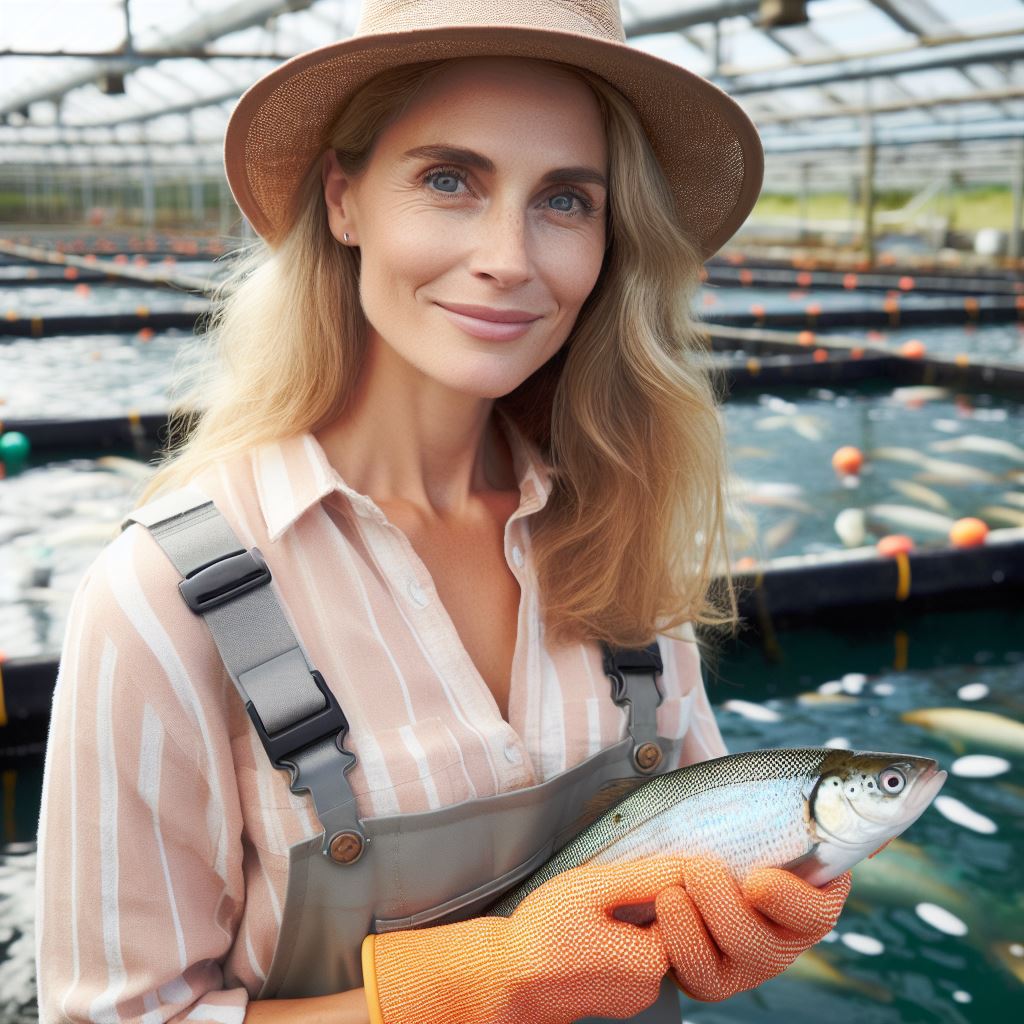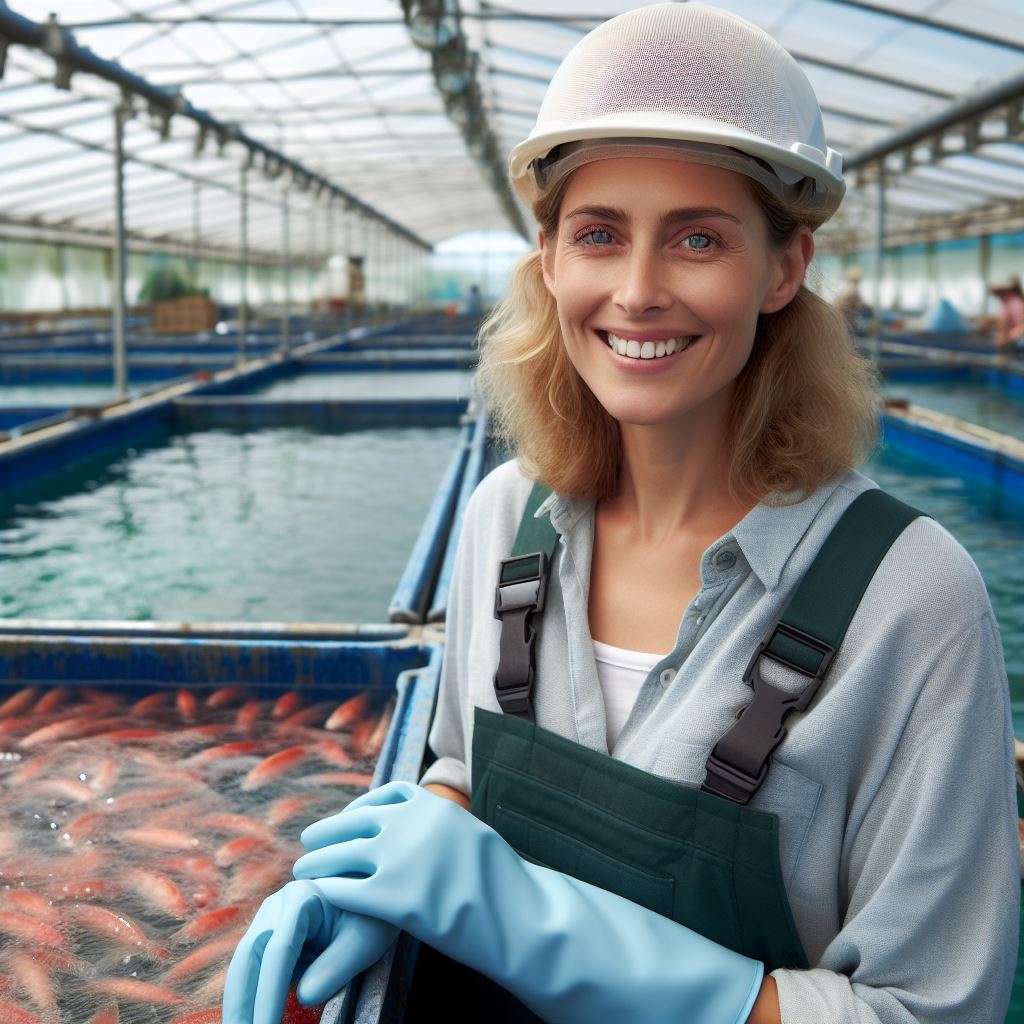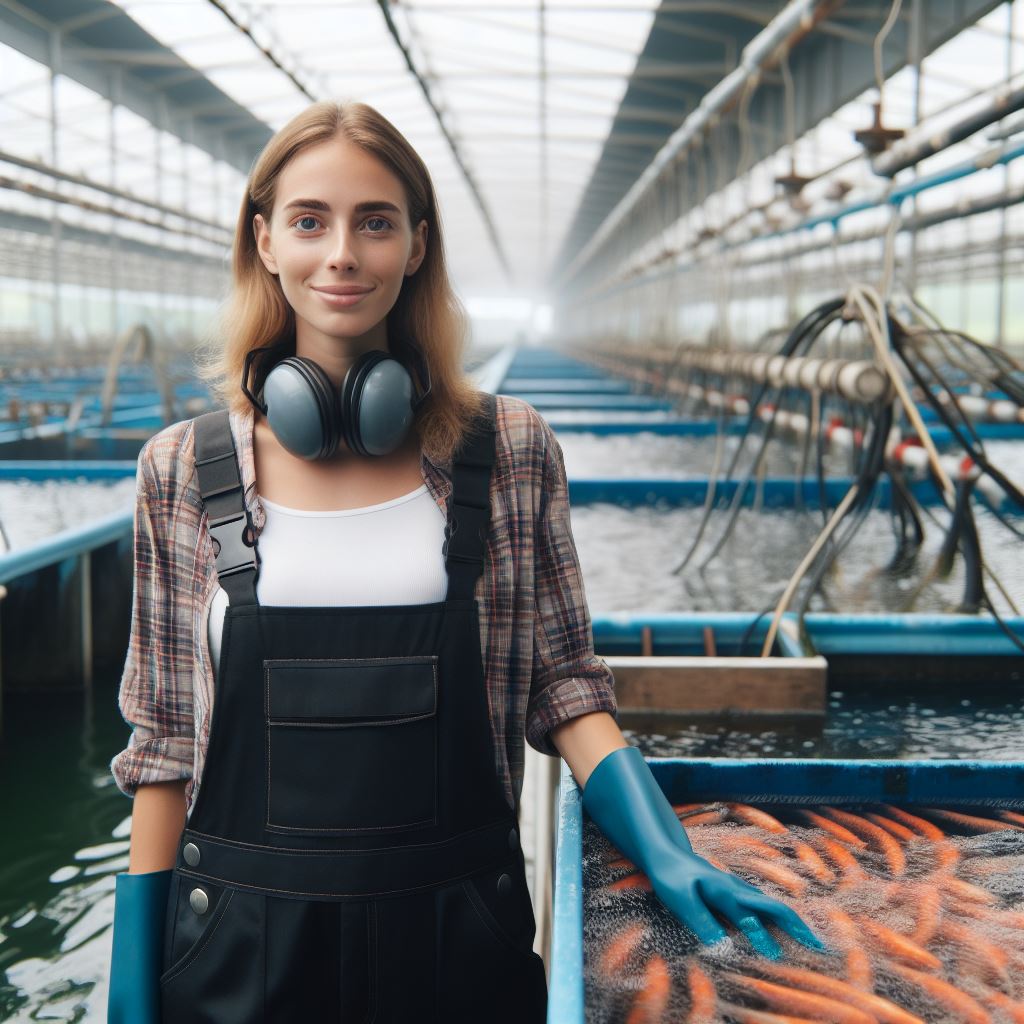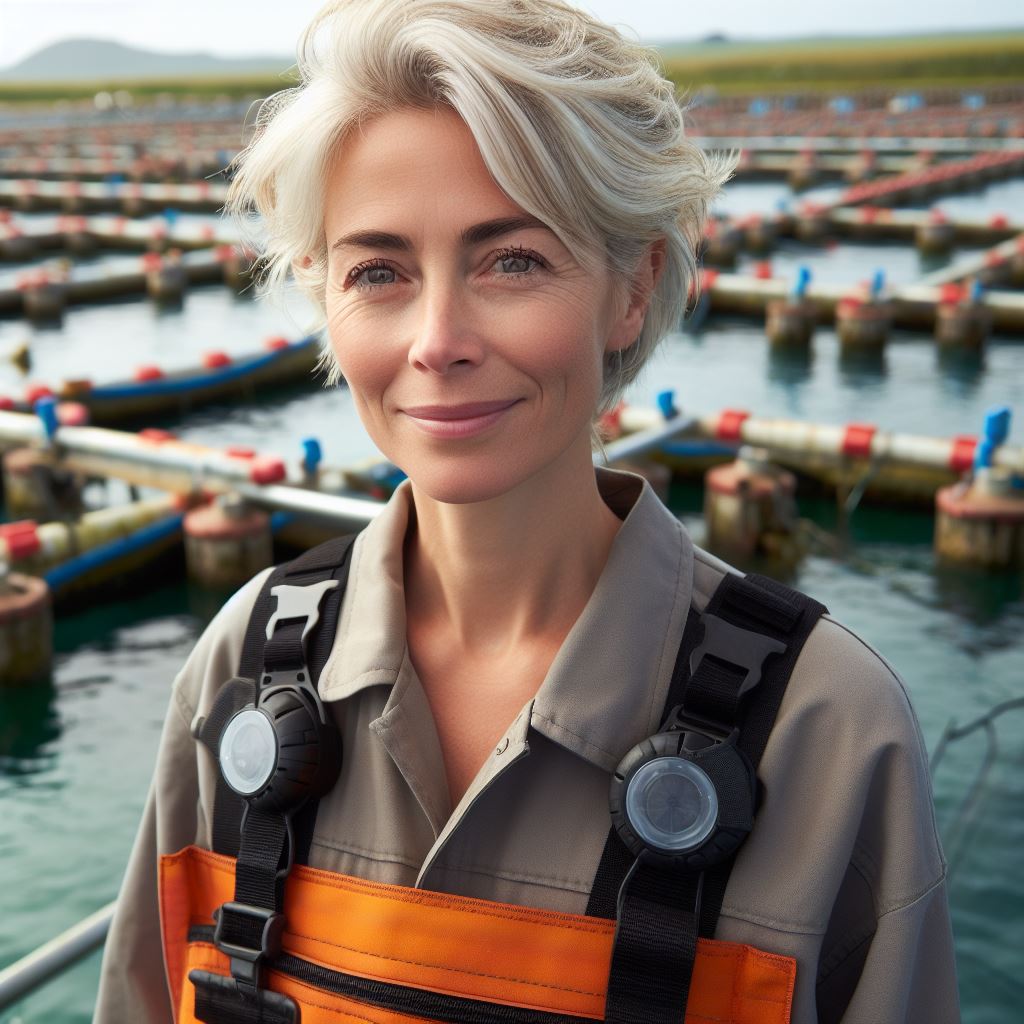Introduction
Aquaculture is the practice of farming aquatic organisms such as fish, shellfish, and seaweed. It plays a vital role in the UK’s seafood production and food security. let’s explore aquaculture technician career FAQs
The UK Aquaculture Technician is a promising career option within the aquaculture industry.
This role involves maintaining and managing aquaculture facilities and ensuring the health and welfare of aquatic organisms.
The purpose of this blog post is to provide answers to frequently asked questions about pursuing a career as an Aquaculture Technician in the UK.
Considering a career change or starting in aquaculture? Gain insights into qualifications, responsibilities, and prospects as an Aquaculture Technician.
We will address common queries such as the necessary educational background and training required.
We will also explore the skills and qualities that are desirable in this field, including problem-solving skills, attention to detail, and a passion for sustainability.
The blog post will shed light on the day-to-day tasks an Aquaculture Technician performs, such as monitoring water quality, feeding and breeding aquatic organisms, and disease prevention.
Additionally, we will discuss the various career paths and progression opportunities for Aquaculture Technicians.
From entry-level positions to managerial roles, the aquaculture industry offers a range of options for professional growth and specialization.
By the conclusion, grasp the essentials of becoming a vital Aquaculture Technician in the UK for sustainable industry growth..
Job Overview
As an Aquaculture Technician in the UK, you play a vital role in the thriving aquaculture industry.
You are responsible for ensuring the health and productivity of aquaculture facilities, which involve various duties and responsibilities.
Role of a UK Aquaculture Technician
- Monitoring water quality parameters such as temperature, salinity, and oxygen levels.
- Feeding and caring for fish, shellfish, and other aquatic organisms.
- Performing routine maintenance and repairs on equipment and systems.
- Conducting regular inspections to identify any signs of disease or stress in the aquatic stock.
- Implementing disease prevention and control measures to minimize risks to the aquaculture facility.
- Collecting samples for laboratory analysis, such as water and tissue samples.
- Recording data and maintaining accurate documentation regarding aquaculture activities.
- Assisting in the development and implementation of aquaculture production plans.
- Working closely with other team members, including scientists, managers, and veterinarians.
- Adhering to health and safety guidelines and regulations to ensure a safe working environment.
Importance of Aquaculture Technicians
Aquaculture Technicians play a crucial role in maintaining the overall health and productivity of aquaculture facilities.
They contribute to the sustainability of the industry by ensuring optimal conditions for aquatic organisms to thrive.
Personalized UK Career Consulting
Receive tailored career guidance designed just for you. Get actionable steps and expert support to boost your career in 1-3 days. Take control of your career now.
Get StartedBy monitoring water quality parameters, Aquaculture Technicians can identify any deviations from optimal conditions, allowing for timely corrective actions.
This helps prevent potential health issues and disease outbreaks, which can be detrimental to the aquaculture facility.
Regular inspections and disease prevention measures implemented by Aquaculture Technicians help maintain the well-being of the aquatic stock.
They contribute to the production of high-quality seafood by ensuring that the stock remains healthy and free from diseases.
In addition, Aquaculture Technicians support research and development initiatives by collecting samples for laboratory analysis.
These analyses provide valuable insights into the health status of the facility and enable informed decision-making.
Furthermore, accurate data recording and documentation by Aquaculture Technicians are essential for tracking production performance and compliance with regulations.
This information facilitates improvements in aquaculture practices and ensures transparency in the industry.
The collaboration with other team members, including scientists, managers, and veterinarians, allows for a comprehensive approach to aquaculture management.
Aquaculture Technicians provide valuable input and support to help optimize production processes and ensure the sustainability of the aquaculture industry in the UK.
Overall, the role of an Aquaculture Technician is vital in maintaining the health, productivity, and sustainability of aquaculture facilities, contributing to the growth of the UK aquaculture industry.
Educational Requirements
Educational background needed to become an Aquaculture Technician in the UK
- To become an Aquaculture Technician in the UK, a strong educational background is essential.
- Employers typically look for relevant degrees or certifications in the field of aquaculture.
- Obtaining a degree in Aquaculture, Marine Biology, or a related field is highly advantageous.
Relevant degrees or certifications
- Other relevant degrees include Fisheries Management, Aquatic Science, or Aquatic Ecology.
- Earning a bachelor’s degree in one of these fields can provide a solid foundation for a career as an Aquaculture Technician.
- In addition to degree programs, there are also vocational programs available for those interested in aquaculture.
Necessary skills and knowledge
- Vocational programs offer practical training and can be completed in a shorter time frame compared to degree programs.
- Some colleges and technical schools offer courses specifically tailored to aquaculture and fish farming.
- Apprenticeships are another valuable pathway to gain necessary skills and knowledge in aquaculture.
- Apprenticeships combine on-the-job training with classroom instruction and can be an excellent way to enter the industry.
- Apprenticeships typically last for a set period, usually a few years, and provide hands-on experience.
- They are offered by aquaculture companies or organizations and can lead to employment opportunities.
- Internships and volunteer positions can also be beneficial in gaining practical experience in the field.
- Internships provide a chance to work alongside experienced professionals and learn the intricacies of aquaculture.
- Attending workshops and industry conferences can further enhance knowledge and skills in aquaculture.
- Continuing education through workshops and conferences allows Aquaculture Technicians to stay updated with the latest industry practices.
Educational requirements for becoming an Aquaculture Technician in the UK vary depending on the employer and specific job role.
However, having a relevant degree or certification greatly increases the chances of securing employment and advancing in the field.
Whether one chooses to pursue a degree, vocational program, apprenticeship, or a combination of these, gaining a strong educational background is crucial in this career.
Your Dream Job Starts with a Perfect CV
Get a tailored CV and cover letter that captures your unique strengths and stands out in your industry. Let us help you make an unforgettable first impression.
Get StartedAcquiring the necessary skills and knowledge through appropriate educational pathways.
Ensures that Aquaculture Technicians are well-equipped to contribute to the industry’s growth and development.
Read: Day in the Life of a UK Aquaculture Technician
Skills and Qualities
Essential skills and qualities
- Strong knowledge of aquatic biology, fish physiology, and water chemistry.
- Ability to handle and care for various species of fish and other aquatic organisms.
- Proficiency in water quality testing techniques and analysis.
- Understanding of aquaculture systems, including filtration, aeration, and monitoring equipment.
- Knowledge of environmental regulations and compliance standards.
- Experience in maintaining records, monitoring inventory, and data collection.
- Ability to operate and maintain aquaculture equipment and machinery.
- Capable of identifying and treating common fish diseases and parasites.
- Strong organizational and time management skills.
- Physical fitness and the ability to perform manual labor in varying weather conditions.
- Attention to detail and accuracy when performing tasks and recording data.
- Good problem-solving abilities and the ability to troubleshoot issues that arise.
- Strong communication skills to collaborate with team members and report findings.
- Flexibility and adaptability to handle changing priorities and work schedules.
- Commitment to animal welfare and a responsible approach to sustainable aquaculture practices.
Practical skills, such as water quality testing and fish handling
Practical skills play a vital role in the role of an Aquaculture Technician. These skills include water quality testing and fish handling.
Water quality testing ensures that the aquatic environment is suitable for the health and growth of fish.
Technicians must be adept at conducting tests, interpreting results, and making necessary adjustments to maintain optimal conditions in the aquaculture system.
Fish handling is another essential practical skill. Technicians must be able to handle fish with care, minimizing stress and injury.
This includes properly capturing, transferring, and releasing fish, as well as implementing appropriate feeding practices.
Problem-solving abilities, strong communication, and attention to detail
Problem-solving abilities are crucial for Aquaculture Technicians as they encounter various challenges in their work.
They must be able to identify issues such as disease outbreaks, water quality fluctuations, or equipment malfunctions, and take prompt and effective action to resolve them.
Strong communication skills are essential for collaborating with other members of the aquaculture team.
Technicians must be able to convey information, ask for assistance when needed, and report findings accurately and clearly.
Attention to detail is critical in aquaculture, as even small errors or oversights can have significant impacts on the health and well-being of fish.
Technicians must carefully follow protocols, maintain accurate records, and monitor the system diligently.
In essence, Aquaculture Technicians require a diverse set of skills and qualities to excel in their roles.
Optimize Your LinkedIn for Success
Boost your LinkedIn profile with a professional bio, keyword-rich headline, and strategic recommendations that attract recruiters. Stand out from the crowd and get noticed.
Optimize NowPractical skills like water quality testing and fish handling, along with problem-solving abilities, strong communication, and attention to detail, are all vital for success in this field.
Read: Sustainable Practices in UK Aquaculture Tech
Career Prospects
Curious about the future as a UK Aquaculture Technician? Opportunities abound for career growth and specialization. Dive into the potential paths awaiting you!
- Explore Specialization: Aquaculture Technicians can carve unique niches, specializing in fish health or hatchery management, enhancing their expertise.
- Endless Growth: With the aquaculture industry’s escalating importance and demand, technicians have vast potential for career advancement.
- Niche Focus: Specializing in fish health opens doors to roles ensuring aquatic inhabitants thrive, propelling your career to new heights.
- Hatchery Mastery: A focus on hatchery management positions you as a crucial player in the aquaculture lifecycle, offering unparalleled career satisfaction.
- Progressive Industry: The ever-expanding aquaculture industry guarantees continuous growth, making it an exciting landscape for ambitious technicians seeking advancement.
- Dynamic Roles: As the industry evolves, Aquaculture Technicians can adapt and take on diverse roles, broadening their skill set and career prospects.
- Future-Proof Careers: The upward trajectory of the aquaculture sector ensures job security and promising career paths for dedicated technicians.
- Unveil Opportunities: Seize the chance to progress within the aquaculture realm, as the industry’s growth accelerates, offering endless career possibilities.
So, buckle up for an enriching career journey, as a UK Aquaculture Technician, where every day promises new challenges and opportunities for professional development.
Career paths and advancement opportunities
Aquaculture Technicians can pursue various career paths within the industry, including fish hatchery management, fish health monitoring, and aquatic research.
Possibility of specializing in specific areas
- Specializing in specific areas of aquaculture, such as fish health or hatchery management, can open doors to higher-level positions and increased responsibilities.
- The demand for skilled Aquaculture Technicians is on the rise, thanks to the increasing importance of sustainable seafood production and the need for efficient aquaculture practices.
- With the UK government’s focus on expanding aquaculture operations, the industry is expected to experience significant growth in the coming years, creating even more career opportunities.
- Aquaculture Technicians can advance their careers by gaining additional certifications and qualifications related to aquaculture management, aquaponics, or environmental sustainability.
- Opportunities for career advancement also exist in academia and research institutions, where Aquaculture Technicians can contribute to scientific studies and innovation in the field.
- As Aquaculture Technicians gain experience and develop expertise in specific areas, they can become valuable assets to aquaculture companies and may be promoted to supervisor or management positions.
- The aquaculture industry is expected to play a crucial role in meeting the growing demand for seafood while minimizing the impact on wild fish populations.
- This increasing importance of aquaculture translates into a broader range of career prospects for Aquaculture Technicians.
- Whether it’s working at commercial fish farms, research facilities, or government agencies, Aquaculture Technicians have numerous opportunities to contribute to sustainable aquaculture practices.
Growth within the aquaculture industry
- With the potential for growth within the industry, Aquaculture Technicians can look forward to long-term career stability and job security.
- The ability to specialize in specific areas, such as fish health or hatchery management, can lead to higher salaries and more senior positions.
- Aquaculture Technicians can also explore entrepreneurship opportunities, such as starting their own aquaculture businesses or consultancy firms.
- Considering the ongoing developments in aquaculture technology and practices, continuous learning and staying updated with industry trends can enhance career prospects for Aquaculture Technicians.
In fact, Aquaculture Technicians in the UK have promising career prospects with opportunities for specialization, growth, and advancement within the rapidly expanding industry.
Read: Aquaculture in the UK: Education Pathways

See Related Content: Innovations in UK Forestry Techniques
Job Market and Salary Expectations
Overview of the current job market for Aquaculture Technicians in the UK
When it comes to the job market for Aquaculture Technicians in the UK, the outlook is promising. Here is an overview of the current situation:
The demand for professionals in this field and potential job prospects
- Increasing Demand: There is a growing demand for professionals in this field due to the expansion of the aquaculture industry.
- Favorable Prospects: Job prospects are high for Aquaculture Technicians, with opportunities available in both public and private sectors.
- Skills in Demand: Employers are particularly interested in candidates with expertise in fish health, nutrition, and water quality management.
- Regional Variances: Job opportunities may vary across different regions in the UK, with higher demand in areas with a strong aquaculture presence.
- Government Initiatives: The UK government has been actively promoting the development of aquaculture, which further boosts the job market.
- Career Progression: Aquaculture Technicians who gain experience and further qualifications can advance to supervisory or managerial roles.
Average salary ranges and benefits that can be expected in this career
Now, let’s shift our focus to salary expectations and benefits in the Aquaculture Technician career:
- Average Salary Ranges: The salary for Aquaculture Technicians in the UK can vary significantly, ranging from £18,000 to £30,000 per year.
- Experience Matters: Those with more experience and specialized skills may command higher salaries within the industry.
- Additional Benefits: Apart from salary, professionals in this field may enjoy benefits like pension schemes, healthcare coverage, and paid leave.
- Training Opportunities: Many employers provide training opportunities to enhance skills and knowledge, which can lead to career progression and higher salaries.
- Industry Growth: As the aquaculture sector continues to expand, there is a possibility of increased investment and improved salary packages.
To summarize, the job market for Aquaculture Technicians in the UK shows great potential with increasing demand and favorable job prospects.
Salary ranges can vary based on experience and skills, while additional benefits are also offered by employers.
With the aquaculture industry expected to grow further, this career path holds promising opportunities for those interested in working with aquatic organisms.
Read: UK Aquaculture: Salary & Career Outlook 2024
Discover More: Arborist Career Paths: UK Opportunities
FAQs
1. What qualifications do I need to become a UK Aquaculture Technician?
To become a UK Aquaculture Technician, you generally need a degree in subjects like aquaculture, marine biology, or a related field.
2. Are there any specific skills or attributes required for this career?
Yes, you should have excellent problem-solving skills, attention to detail, and the ability to work in a team.
3. What are the typical working conditions for Aquaculture Technicians in the UK?
Aquaculture Technicians work both indoors and outdoors, often in harsh weather conditions. They may also be required to work evenings and weekends.
4. Are there any misconceptions about being a UK Aquaculture Technician?
Yes, one common misconception is that this job only involves feeding fish. In reality, it requires a range of technical and scientific skills.
5. How long does it take to train as an Aquaculture Technician?
The training period can vary, but it typically takes around 2-4 years to become fully qualified.
6. What are the job prospects like for Aquaculture Technicians in the UK?
The demand for skilled Aquaculture Technicians is expected to grow, with opportunities available in both public and private sector organizations.
7. Is there a specific hiring process for Aquaculture Technician positions?
The hiring process usually involves submitting an application, attending an interview, and potentially undergoing practical assessments.
8. What are the career progression opportunities for Aquaculture Technicians?
With experience and additional qualifications, Aquaculture Technicians can progress to roles such as Aquaculture Manager or Research Scientist.
9. Are there any risks or safety considerations associated with the job?
Working with aquatic animals and in aquatic environments comes with certain risks, so following safety protocols is crucial for minimizing hazards.
10. Do Aquaculture Technicians have opportunities for professional development?
Yes, there are various professional development courses and certifications available to enhance skills and knowledge in aquaculture practices.
11. Can I start my own aquaculture business after gaining experience as a Technician?
Yes, gaining experience as a UK Aquaculture Technician can provide a solid foundation for starting your own aquaculture venture.
12. What is the average salary for Aquaculture Technicians in the UK?
The average salary for Aquaculture Technicians in the UK ranges from £18,000 to £25,000 per year, depending on experience and qualifications.
13. Are there any networking opportunities within the aquaculture industry?
Yes, there are industry events, conferences, and associations dedicated to aquaculture that provide networking opportunities for professionals in the field.
14. Can I work as an Aquaculture Technician part-time or on a flexible schedule?
Part-time and flexible working arrangements may be available, but it largely depends on the specific employer and their operational requirements.
15. What is the most rewarding aspect of being an Aquaculture Technician?
Many Aquaculture Technicians find the satisfaction of contributing to sustainable food production and conservation efforts to be highly rewarding.
Conclusion
In closing, the role of Aquaculture Technicians in the UK aquaculture industry is crucial.
They play a vital role in ensuring the health and well-being of aquatic animals and the success of aquaculture operations.
From maintaining water quality to monitoring and managing fish populations, their expertise is invaluable.
Aquaculture Technicians are responsible for conducting research, implementing best practices, and following regulations to ensure sustainable and efficient aquaculture practices.
They are at the forefront of technological advancements and innovative techniques in the field.
The demand for Aquaculture Technicians in the UK is expected to rise as the aquaculture industry continues to expand.
Their skills and knowledge are highly sought after, making this a promising career path for those interested in aquatic life and conservation.
If you have a passion for marine life and enjoy working in a hands-on environment, a career as an Aquaculture Technician might be the right fit for you.
It offers an opportunity to contribute to sustainable food production and conservation efforts while working with diverse aquatic species.
Whether you choose to work in a freshwater or marine setting, as an Aquaculture Technician, you will have the chance to make a real difference in the industry.
By ensuring the health and well-being of aquatic animals, you will help meet the increasing demand for seafood while maintaining ecological balance.
If you are interested in pursuing a career as an Aquaculture Technician, it is crucial to obtain the necessary education and hands-on training.
Building a network within the industry and keeping up-to-date with the latest advancements is also essential.
In conclusion, a career as an Aquaculture Technician offers exciting opportunities for individuals passionate about aquaculture and aquatic conservation.
Consider exploring this path if it aligns with your interests and goals.
[E-Book for Sale]
500 Cutting-Edge Tech Startup Ideas for 2024 & 2025: Innovate, Create, Dominate
$19.99 • 500 Tech Startup Ideas • 62 pages
You will get inspired with 500 innovative tech startup ideas for 2024 and 2025, complete with concise descriptions to help you kickstart your entrepreneurial journey in AI, Blockchain, IoT, Fintech, and AR/VR.



